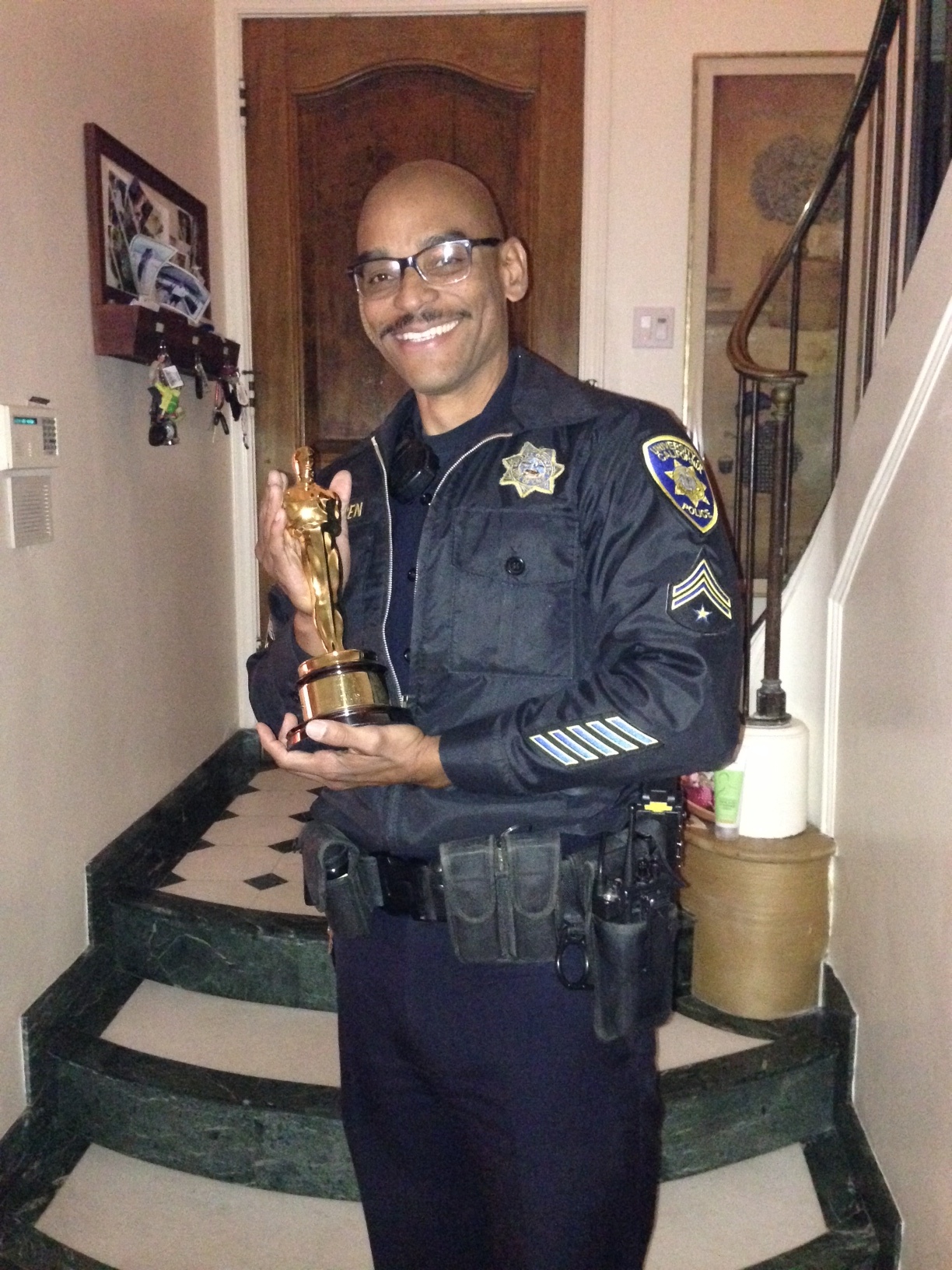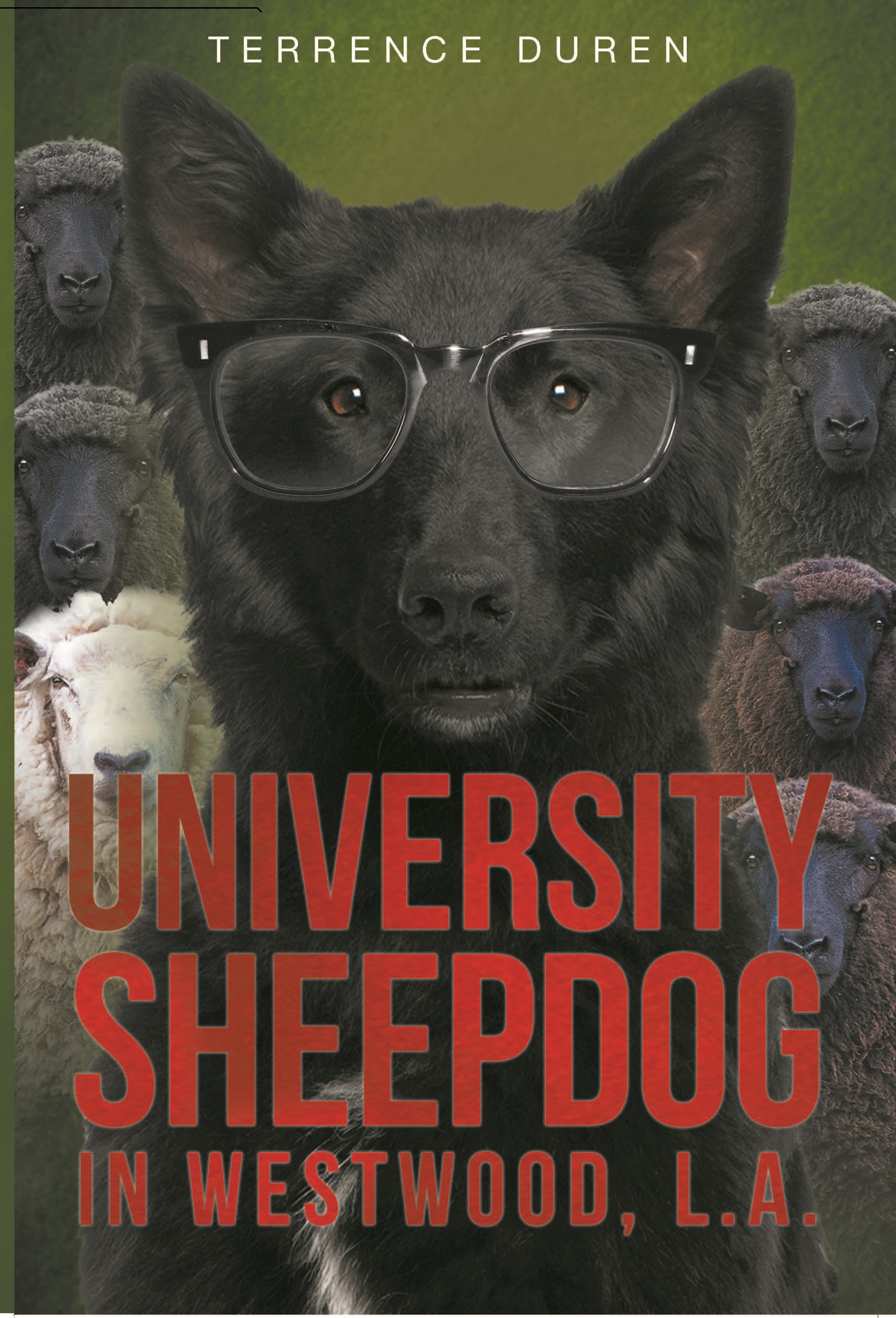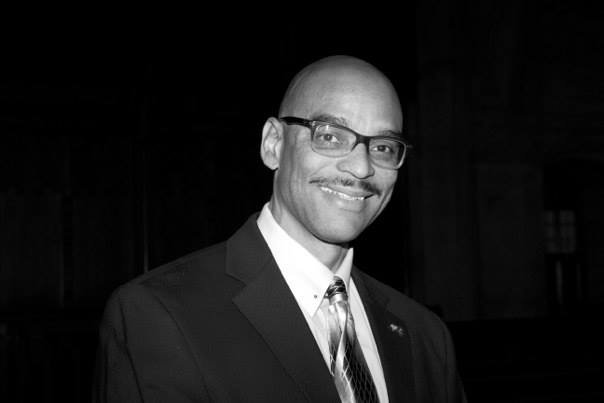Retired Officer Terrence Duren-“University Sheepdog”
Book Reviews, Community News, News2 — By Buddy Sampson on July 26, 2016 at 7:33 pm

Cover and Inside Cover- Officer Terrence Duren. He has a gripping account of his service as a police officer in the book, "University Sheepdog in Westwood, CA," available soon in bookstores.
By Buddy Sampson
The young police officer spots a Mercedes Benz blocking an alley in an area in Westwood, CA. No cars could pass. The car was parked illegally. The officer decides to do an enforcement stop. He becomes aware that there are four men in the car. To his surprise, the driver exits the automobile and is dressed in the regalia of one of the most dangerous, controversial and respected security forces in the world. The situation is tense. The officer instructs the driver to get back in the car, but he doesn’t comply. The officer knew he was in imminent danger. The other three men begin to exit the car. What does he do? How can he escape this situation to be able to go home to his wife and family? And how would you handle this situation?
Officer Terrence Duren details this encounter in his book, “University Sheepdog in Westwood, CA.” Officers are often presented very dangerous situations that most of us will never face in our lifetimes. Police officers are in the spotlight in the news now, with all the requisite echoes of a time many thought was beyond us, issues of the community vs. police. Most police officers want the same rights and principles that everyone else enjoys, the only difference is that police officers often have to make life and death decisions on the fly. And if you’re Officer Terrence Duren, who worked for the Long Beach Police Department, was a reserve police officer for the Pasadena Police Department, a member of the El Camino College Police, a security officer for the Hawthorn Mall, The Bel Air Petrol, and the UCLA Police Department among others, the conflict of being an African American man, who has also been stopped and profiled by police himself, and being a police officer, who is sometimes reviled by the public, presents a particular sense of conflict. Those conflicts, along with growing up in a family that was sympathetic with The Black Panthers are chronicled in his gripping book, “University Sheepdog in Westwood, LA.”
Officer Terrence Duren’s book, which is due for release soon, is a gripping account of the life of a police officer, his experiences growing up in South LA and the many life and death experiences he encountered, which include several traumatic incidents of his childhood. “My first chapter is about an officer involved shooting,“ he explained. “I shot this guy and I was criticized for that. I was exonerated and all that good stuff, but I understand why people don’t have trust in the police.”
But why become a police officer? Duren, who also served as a Marine, and is a recent retiree from the UCLA Police Department, went on a ride-a-long with his cousin and fell in love with the idea of being a police officer. “I couldn’t get the ride-a-long out of my mind,” he laughed. “It was the early 80s and LA was having 1000 homicides a year, terrible shoot ‘em up days. My cousin grew up wanting to be a cop. I grew up wanting to be an astronaut.” Duren has an interesting family history. His aunt, Betty Ann was affiliated with The Black Panthers. However, his aunt was killed, unfortunately, in an encounter with the police. ”I knew my aunt and I knew she wasn’t stupid enough to point a gun at a cop,” he tearfully explained. “I think what happened- there was a gun- it was probably in the glove compartment and it may have just fallen out and the cop overreacted- I don’t know, I wasn’t there. I can’t believe that. But I made an arrest of some juveniles once and they were committing burglaries and I spoke with the mother and she said, ‘I know my son,’ he wouldn’t have done that. But he did and I understood her pain. But he committed a burglary. I can’t bring myself to believe that she pulled a gun on a cop. But she may have.” Among his heroes are Bass Reeves, a U.S. Marshal who many historians view as the inspiration for the character “The Lone Ranger.” Before becoming a US Marshal, Bass Reeves was an escaped slave.
He details his work as an undercover officer and how racial profiling isn’t an answer. “Racial profiling is stupid,” said Duren. “If I was a drug dealer and were transporting drugs, I would use White people. If I think the nearest police agency is just stopping brothers, I wouldn’t hire any brothers. I would get me some White folks, and believe me, there’s some White folks out there that are transporting drugs. I dealt with them when I was working undercover. They exist.” While working at UCLA’s police department, he discovered a disturbing trend in burglaries. “We were looking for burglaries and the Black burglars were organized, the White burglars were not, they were just opportunists,” he said. “And at UCLA there was a theft problem with Asian females.” Duren lists several mentors that helped steer his path in the right direction as a youth. “The men of C.O.R.E., my grandfather, Ray Hicks, The Black Panthers, those were the men I grew up around,” said Duren. “These were men. They may not have been perfect, but they stood on their principles. You may not agree with them, but they had principles.”
On the current unrest following the deaths of Philando Castile in St. Paul, Minnesota and Alton Sterling of Baton Rouge, Louisiana Duren was candid in his response. “You don’t try those cases in the media,” said Duren. ”I’m glad the Justice Department and the federal government are investigating those cases. It would behoove the Baton Rouge Police department to give everything to them and let them handle it. They have more credibility.”
Duren has important advice for citizens involved in traffic stops or detainments. “Don’t charge a cop, don’t fight a cop,” Duren warns. “Because you might die.” Sadly, according to the Bureau of Justice Statistics, Black men are more likely than other cultures to be pulled over by police; so many parents have had to have a talk with their children, particularly their sons on the appropriate behavior to implement when a police officer has pulled you over on a traffic stop.” I’d be derelict in my duties as a father to not have a talk with my son,” he said of “the conversation” fathers and mothers have with their children. ”If you fight a police officer, right or wrong, you may lose your life. Right or wrong, if you’re dead, and you have grieving parents, they may get a couple million dollars in their pocket. But you are dead, and your mother will be grieving for the rest of her life because your dumb ass decided to fight a cop. Be wise and stay alive.”
In light of the many high profile police cases with the lack of prosecution of officers that appear to be involved in misconduct, Duren was asked if there are any cases in which cops are prosecuted. His answer was candid. “Yes,” he said. “Cops have been convicted, you just don’t know about it.” He recounted a case in which several LAPD officers were being investigated for burglaries committed while on duty. “One of the LA officers was actually caught because he had a stolen Rolex watch on, on duty, so it does happen. “
In the media reports of high profile police cases, and images of Blacks in the media, Duren was candid. “The image of young Black folks is terrible,” he said. “And a lot of it has to do with us. The use of the “N” word, the violence in the new hip hop stuff. “ Regarding groups like NWA, who made the community anthem “F**k The Police, Duren has an opinion different than most police officers. “I wasn’t intimidated by the song, but some officers were very intimidated by that song and even the F.B.I. came after them,” he explained. “They weren’t saying ‘F**k The Police because of the Compton P.D. but because of the Torrance P.D. and the Torrance P.D. has a reputation. And they know they have a reputation. “
Officer Terrence Duren admits there is a lot of work to be done to establish trust between police and the community, especially in light of the recent events and protests over police brutality. However, he offers some practical solutions for the community and the police. “I tell young officers that you have to read and have an understanding of the people that you are policing.” he said. “If I’m in a Chinese area, I’m going to read up on Chinese culture. If you are in a Black neighborhood, if you haven’t read Malcolm X, you should read ‘The Autobiography of Malcolm X,’ Go to Eso Wan bookstore and read up on Black history. Talk to some Black folks, they’ll tell you what to read. Just have an understanding. I’m not saying to agree, just have an understanding of who you are dealing with and understand the history of the community.” In terms of the community, the community must be proactive in helping rid their areas of crime and gangs. “Snoop Dogg and The Game had a major meeting with Black gangsters,” he said, giving an example of the community getting involved. “I applaud that.” In his book, he talks about his encounters with Mexican, Asian and Black gangs and the difference between them. “Black and Hispanic gangs don’t value education,” he said. “Asian gangs do and I’ve dealt with them. They’re students in the day and gangsters at night.”
However, being a police officer is not devoid of controversy, strife and tribulations. Being an African American police officer often presents a quandary. “I have a different take than Sheriff David Clarke,” said Duren, when asked about Milwaukee Sheriff David Clarke’s controversial denouncement of the “Black Lives Matter movement. “If I denounce groups like ‘Black Lives Matter,’ then I’m denouncing the folks I grew up around. And they weren’t bad people. The Klan (the Ku Klux Klan) went around and they went into folks homes and hanged the men, and “Black Lives Matter” isn’t doing that. But their rhetoric is stirring up folks who don’t know our history.”
“I don’t just arrest Black kids,” he said. “I talk to them about history because they don’t know our history. Duren feels strongly that the Black community, particularly young men and women of color, should research, read and learn about African American history and frequent traditional stores in the Black community, such as Eso Won Books, located in Leimert Park, CA. “Eso Wan should be thriving,” said Duren about the historic book store. “It should be as big in the community as Barnes and Noble. “
There are good cops and bad cops. Unfortunately, good police officers that serve their communities with honor, respect and courage are not widely mentioned in the media. Yes, there are cops that deserve to be prosecuted. But we must recognize that without police departments in our cities, total anarchy and chaos would be the norm with dramatic increases of crime. “How long would it take when gangsters figure out, ‘hey the cops aren’t stopping anyone,” he reflected. “They would say, ‘let enact our revenge on folks. Baltimore’s crime rate skyrocketed after Freddie Gray. The murder rate went off the charts. Babies were being killed. And people say we don’t need the police.” Policing and good officers similar to Officer Terrence Duren are the norm, but the sexy story is the story of police misconduct and abuse. “I’ve been a cop for 33 years, “Duren explained. “Cops make mistakes; yes we have some dumb cops. Out of 600,000 cops there will be some incidents. But how many incidents do we do a day and how many actually turn bad? Less than 1%. And there are several videos of officers shooting White folks, but it doesn’t make news, because it isn’t sexy. But if you continuously show Black men getting shot, the image the public has is that only Black men are getting shot. And it’s not true.” Duren lists his wife, Yvette, a marriage therapist, as one of his biggest inspirations. “I see how hard my wife works and she has always had my back,” he said. “I just want the best for her.” Duren hopes that readers will be educated in regard to the lives of police officers and gain a unique perspective that has not been addressed previously in print.
“University Sheepdog” promises to be an exciting book, with scenarios, history and a perspective that will keep you on the edge of your seat. For more information on the book, please visit www.thescoopla.com.
The opinions expressed by the subjects in this article are not the opinions or statements of UCLA, LAPD, any other police agencies or The Scoop LA.



 Tweet This
Tweet This Digg This
Digg This Save to delicious
Save to delicious Stumble it
Stumble it




